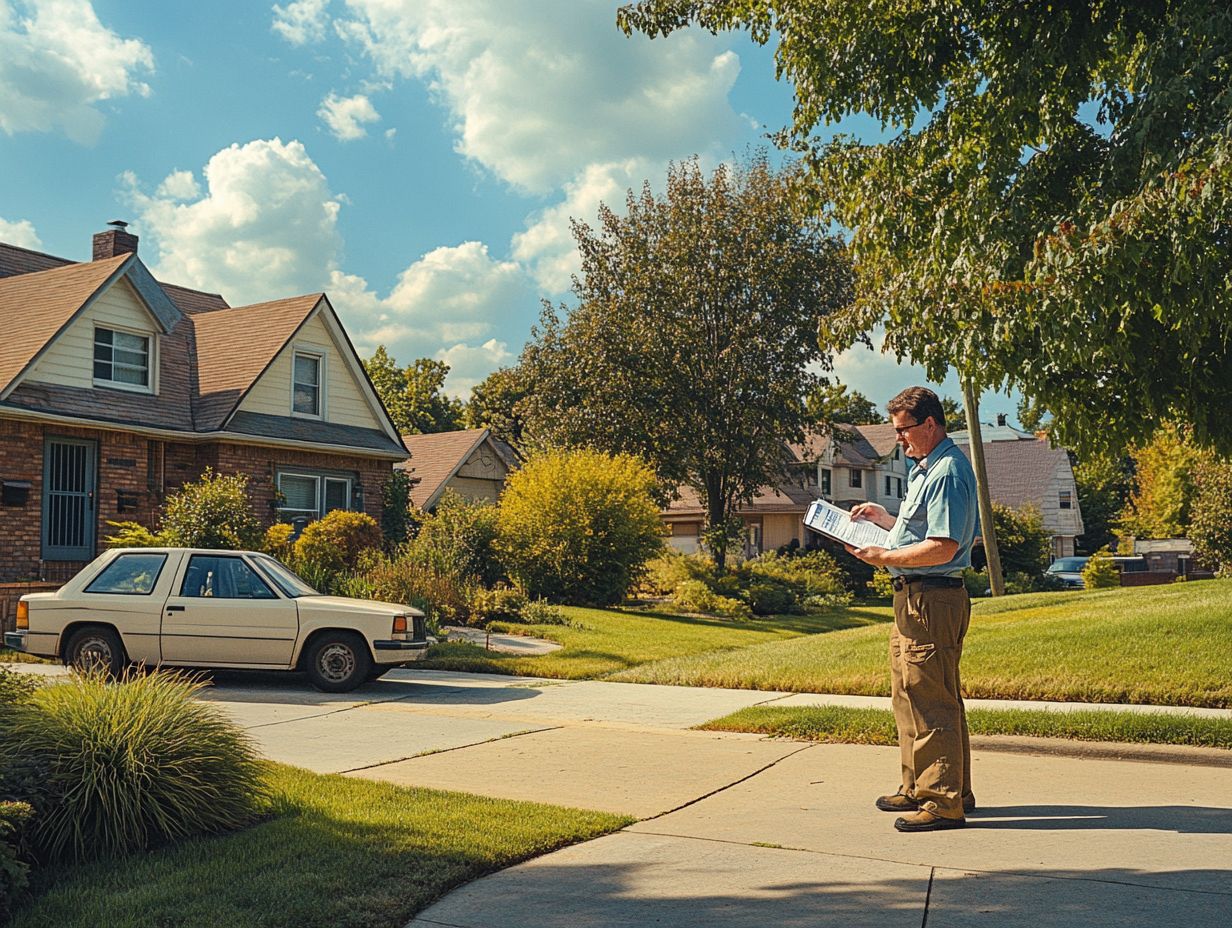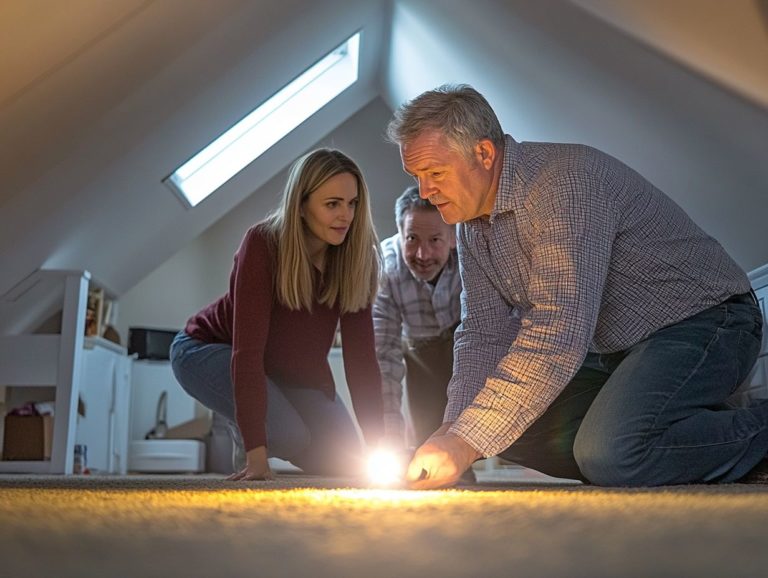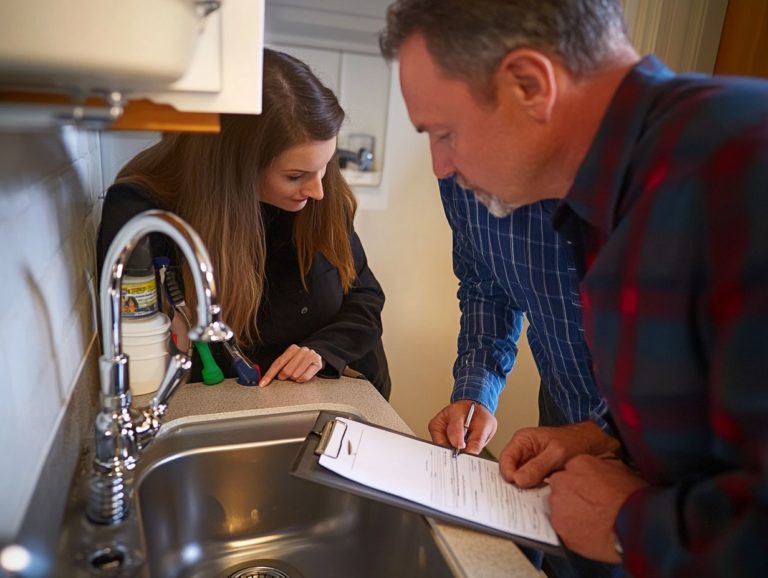Understanding Home Inspection Costs
Buying a home stands as one of the most significant investments you ll ever make. A thorough home inspection is essential to ensure you re making a sound decision.
This article delves into what a home inspection involves. It also covers factors that influence costs and guidance on selecting a qualified inspector.
Whether you re a first-time buyer or a seasoned homeowner, grasping these elements will empower you to navigate the real estate market with confidence.
Contents
Key Takeaways:

A home inspection is a thorough examination of a property’s condition, typically done before a purchase or sale. Its purpose is to identify any problems or potential issues with the home.
- Several factors can affect the cost of a home inspection, such as size, age, and location.
- Research market rates and carefully consider the services included in the inspection.
- Standard inclusions cover major components, but additional services and fees may apply for specialized inspections.
- Review the results of the inspection report and address any issues found.
What is a Home Inspection?
A home inspection is an in-depth evaluation carried out by seasoned inspectors, offering invaluable insights into the property’s condition before you seal the deal on a home purchase.
This meticulous process involves examining important parts of the home, such as structural elements, heating, ventilation, and air conditioning (HVAC) systems, plumbing, and more. The goal is to uncover any existing problems or concealed issues that could impact the property’s value.
Don’t overlook your home inspection! It’s key to making smart financial choices and enhancing your negotiating power during the home buying journey.
Factors that Affect Home Inspection Costs
The cost of a home inspection can fluctuate considerably due to various factors, including the property’s size, age, and prevailing local market rates. It’s crucial for you as a homebuyer to grasp these variables by referring to understanding the cost breakdown of home inspections when budgeting for your inspection.
Average inspection fees tend to vary from one city to another. For instance, places like LaGrange, Illinois, and New York City showcase unique pricing structures shaped by local regulations and demand. Understanding these nuances helps you make informed decisions throughout your home-buying journey.
Size and Age of Home
The size and age of a home are pivotal factors that can greatly affect the overall cost of a home inspection. Larger properties typically require more time and resources for a thorough evaluation. Older homes may present complex issues that require specialized inspections.
Consider a sprawling estate; it not only requires additional man-hours but also may necessitate a wider array of testing for systems like plumbing and electrical work. Conversely, older homes come with their own set of unique challenges, including outdated materials and potential code violations, which can extend the inspection process.
As a homeowner, you might encounter unexpected costs not just from the inspection itself, but also from repairs that could arise during this detailed assessment. Therefore, it s crucial for prospective buyers like you to recognize these factors, as they can significantly influence your budget and long-term investment choices.
Location and Market Rates
Location is crucial when it comes to home inspection costs, as market rates can vary significantly across cities like Detroit, Texas, and San Antonio. You may notice that the average pricing for inspection services differs quite a bit depending on where you are.
For example, in bustling metropolitan areas with high demand and elevated living expenses, such as San Francisco or New York City, inspection fees are often much higher. This increase is typically due to greater operational costs and stricter regulatory requirements that come into play.
Local regulations might require more comprehensive inspections or specific certifications, which naturally drives up the fees for those services. For detailed information, check out our guide on understanding home inspection fees and costs. On the flip side, smaller towns or cities may offer lower home inspection costs, thanks to less regulatory oversight and a more affordable cost of living.
As a homebuyer or seller, it s essential to stay attuned to these geographical differences. Understanding the local landscape can help you budget more effectively and master the art of negotiation.
What is Included in a Home Inspection?

A comprehensive home inspection typically encompasses standard elements that address the major systems and components of a property.
This thorough assessment equips you with a detailed inspection report that outlines the current condition of your home and highlights any issues that may require your attention or further evaluation.
Standard Inclusions
In a home inspection, you can expect a careful check of major systems like electrical, plumbing, and heating, ventilation, and air conditioning (HVAC).
This ensures you receive a comprehensive property assessment before making any financial commitments.
The inspector will also closely examine the roof, foundation, and insulation.
Each of these components plays a crucial role in the overall stability and comfort of your future home.
The electrical system is vital for safety and maximizing energy efficiency.
Plumbing inspections can uncover potential leaks that could lead to expensive repairs down the line.
HVAC systems are key for maintaining a reliable climate control experience, significantly impacting indoor air quality and energy consumption.
A thorough evaluation of these systems is critical as it lays the foundation for the inspection report.
This gives you the power to make informed decisions based on the true condition of the property, ensuring you embark on your homeownership journey with confidence.
Additional Services and Fees
Along with standard evaluations, many home inspectors offer specialized inspections for issues like radon, termites, and mold.
While these may come with extra fees, they provide invaluable insights into hidden problems that could affect your home’s value and safety.
These specialized services are essential for both potential buyers and current homeowners.
They help uncover environmental hazards and structural concerns that might not be visible during a routine inspection.
For instance, radon testing typically costs between $100 and $300.
Yet, it can detect this dangerous gas, which is the second leading cause of lung cancer.
Similarly, termite inspections usually range from $75 to $200 and can help you avoid significant financial losses from pest damage.
Investing in these additional services now ensures your peace of mind later!
How to Choose a Home Inspector
Choosing the right home inspector is key to your success as a homebuyer!
This choice provides not only peace of mind but also valuable insights into the condition of the property.
It requires thoughtful assessment of their qualifications, certifications, experience, and reputation within the real estate market.
Taking this step seriously can make all the difference in your home-buying journey.
Qualifications and Certifications
When hiring a home inspector, it s crucial to consider qualifications and certifications.
Those certified by esteemed organizations like the American Society of Home Inspectors (ASHI) showcase a steadfast commitment to high standards and professional ethics in their field.
Such certifications validate an inspector’s expertise and ensure adherence to a strict code of conduct, ultimately safeguarding your interests as a homebuyer.
Inspectors with credentials from the International Association of Certified Home Inspectors (InterNACHI) typically undergo rigorous training.
This equips them to spot potential issues that others might overlook.
These certifications can significantly enhance the credibility of inspections.
Knowing that your inspector is certified provides peace of mind, assuring you that you re receiving a thorough evaluation an essential factor in making informed, long-term investment choices.
Experience and Reputation

The experience and reputation of a home inspector can significantly impact the quality of your inspection. Seasoned professionals are more adept at uncovering hidden issues and providing accurate evaluations that could influence your financial decisions as a homebuyer.
To ensure you make a well-informed choice, you ll want to review testimonials and feedback from past clients when assessing potential inspectors. Many experienced inspectors showcase a portfolio that highlights their successful inspections, demonstrating their knack for spotting problems that less experienced inspectors might miss.
An established presence in the community often speaks volumes about their reliability and professionalism. Don t hesitate to ask about any relevant certifications and training the inspector has completed. These qualifications can further validate their expertise and boost your confidence in the inspection process.
Understanding the Results of a Home Inspection
Interpreting the results of a home inspection is crucial for you as a homebuyer. The inspection report offers invaluable insights into the property s condition, highlighting any issues that may need your attention.
This information gives you the power to make informed financial decisions. It ensures that you make smart choices as a homeowner.
Interpreting the Report
Interpreting the inspection report can be quite a challenge for homebuyers. However, grasping its findings is essential for making well-informed decisions regarding repairs and negotiations during the home purchase process.
To effectively navigate this intricate document, you ll want to assess the severity of the identified issues by grouping them into critical, moderate, and minor concerns.
Prioritize repairs that could present safety hazards or lead to more significant damage in the future. Being aware of hidden problems, such as mold or electrical issues, which often demand immediate attention, can significantly impact your comfort and future repair costs.
Consulting with a qualified inspector can provide you with deeper insights, helping you determine the necessary actions to take.
Addressing any Issues Found
Addressing any issues discovered during a home inspection is crucial for you as a homebuyer. These concerns can significantly impact both repair costs and your negotiating power in the purchasing process.
Being aware of potential problems enables you to engage in informed discussions with the seller, effectively highlighting the need for repairs or adjustments in the price.
First, categorize issues into minor or major concerns. Minor repairs can often be easily included in the overall purchase agreement, while significant issues may call for more serious considerations, such as a price reduction or requests for immediate repairs before closing.
You can also factor potential repair costs into your financing options, ensuring your investment stays secure. Leveraging a qualified inspector’s report boosts your credibility, paving the way for a smoother negotiation process.
Don’t wait! Use this knowledge to negotiate the best deal on your new home!
Home Inspection FAQs
Home inspection FAQs provide insight into the most prevalent questions that homebuyers often ponder regarding the inspection process. Common inquiries include details about average inspection fees, what you can anticipate during the evaluation, and how to effectively interpret the findings.
Frequently Asked Questions

What are home inspection costs?
Home inspection costs refer to the fees charged by a professional home inspector to assess the condition of a property. To better understand these expenses, consider exploring understanding home inspection fees, as costs can vary depending on the size, location, and age of the property, as well as the experience and qualifications of the inspector.
Why is it important to understand home inspection costs?
Understanding home inspection costs can help you budget for this necessary expense when buying or selling a property. It can also give you insight into the level of detail and thoroughness you can expect from a home inspection.
What Factors Affect Home Inspection Costs?
The size, location, and age of the property can influence home inspection costs.
Other factors include the type of property, such as a single-family home or condo, and any additional services like radon or mold testing.
Are There Hidden Costs in Home Inspections?
Usually, the inspection fee covers the assessment and report.
Make sure to ask the inspector about any extra charges for specialized services.
Can I Negotiate Home Inspection Costs?
It’s rare to negotiate the cost, but you can compare prices from different inspectors.
Remember, the cheapest option might not provide the best service or thoroughness.
What Should I Look for in a Home Inspector?
Consider the inspector’s experience, qualifications, and certifications.
Ask for referrals or read reviews to ensure you choose someone qualified.






